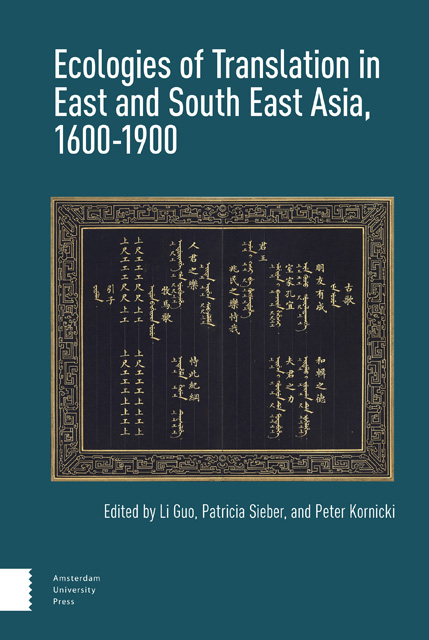Book contents
- Frontmatter
- Table of Contents
- Introduction: Scriptworlds, Vernacularization, and Shifting Translation Norms
- 1 On Not Being Shallow: Examination Essays, Songbooks, and the Translational Nature of Mixed-Register Literature in Early Modern China
- 2 A Faithful Translation: Tsūzoku sangokushi, the First Japanese Translation of Sanguozhi yanyi
- 3 Romance of the Two Kingdoms: Okajima Kanzan’s Chinese Explication of ‘The Annals of Pacification’ (Taiheiki engi)
- 4 Speaking the Sinitic: Translation and ‘Chinese Language’ in Eighteenth-Century Japan
- 5 ‘Body Borrowed, Soul Returned’: An Adaptation of a Chinese Buddhist Miracle Tale into a Vietnamese Traditional Theatrical Script
- 6 ‘Out of the Margins’: The Western Wing Glossarial Complex in Late Chosŏn and the Problem of the Literary Vernacular
- 7 Vernacular Eloquence in Fiction Glossaries of Late Chosŏn Korea
- 8 Imagined Orality: Mun Hanmyŏng’s Late Nineteenth-Century Approach to Sinitic Literacy
- 9 Linguistic Transformation and Cultural Reconstruction : Translations of Gorky’s ‘Kain and Artem’ in Japan and China
- Index
1 - On Not Being Shallow: Examination Essays,Songbooks, and the Translational Nature ofMixed-Register Literature in Early ModernChina
Published online by Cambridge University Press: 16 November 2022
- Frontmatter
- Table of Contents
- Introduction: Scriptworlds, Vernacularization, and Shifting Translation Norms
- 1 On Not Being Shallow: Examination Essays, Songbooks, and the Translational Nature of Mixed-Register Literature in Early Modern China
- 2 A Faithful Translation: Tsūzoku sangokushi, the First Japanese Translation of Sanguozhi yanyi
- 3 Romance of the Two Kingdoms: Okajima Kanzan’s Chinese Explication of ‘The Annals of Pacification’ (Taiheiki engi)
- 4 Speaking the Sinitic: Translation and ‘Chinese Language’ in Eighteenth-Century Japan
- 5 ‘Body Borrowed, Soul Returned’: An Adaptation of a Chinese Buddhist Miracle Tale into a Vietnamese Traditional Theatrical Script
- 6 ‘Out of the Margins’: The Western Wing Glossarial Complex in Late Chosŏn and the Problem of the Literary Vernacular
- 7 Vernacular Eloquence in Fiction Glossaries of Late Chosŏn Korea
- 8 Imagined Orality: Mun Hanmyŏng’s Late Nineteenth-Century Approach to Sinitic Literacy
- 9 Linguistic Transformation and Cultural Reconstruction : Translations of Gorky’s ‘Kain and Artem’ in Japan and China
- Index
Summary
Abstract
This essay treats ‘mixed-register writing’(typically called ‘vernacular Chinese’, ‘plainChinese writing’, baihua 白話) as a hybrid medium thatself-consciously incorporates linguistic elementsfrom different strata of Literary Sinitic,vernacularized Sinitic, and textualized topolect.The chapter examines how a commentaried version ofthe Qing-dynasty songbook Huajian ji 花箋記 (TheFlowery Notepaper, 1713) mediates betweenthe broadly conceived genre of examination essayswritten in Literary Sinitic and popular songbookswritten in Literary Cantonese. In reframing such acompositional process as ‘translation’ subject todifferent kinds of norms and purposes, the chaptershows how the deliberately polyvocal nature ofsuch texts opened a space for literary innovationin China proper as well as in the broaderSinographic sphere.
Keywords: translation norms,intralingual translation, Sinitic, mixedregisterwriting, topolect
Introduction
What constitutes a translation is always subject tonorms within a given language community. As TheoHermans observes, the term translation ‘appeals to arecognizable and circumscribed category, both aknown concept and a socially acknowledged practice’.Ever since Roman Jakobson's seminal division oftranslation into ‘intralingual’ (rewording),‘interlingual’ (translation proper), and‘intersemiotic’ (transmutation) approaches, scholarshave sought to define translation through bothprescriptive and descriptive methods. While thelion's share of such scholarly efforts has beendevoted to interlingual translation inEuropean-language contexts, some scholars havesought to place practices of translation on acontinuum of practices of ‘rewriting’ across allthree of Jakobson's categories. Most famously,perhaps, André Lefevere argued that what he termed‘rewriters’ – a terms designed to capture thebreadth of translational activities – constitutedthe ‘motor force behind literary evolution’, subjectto ideology and poetic aesthetics.
In a recent surge of interest in intralingualtranslation, scholars have paid more attention tohow practices of translational rewriting shaped thetransition to modern written standards withinmodernizing empires and nation-states. Suchinvestigations show that the emergence of modernwritten forms of language was not only mediatedthrough interlingual forms of rewriting but alsodepended heavily on intralingual approaches. Suchrewriting involved the translation of ‘classicaltexts’ into modernized written ‘vernaculars’ whileaccommodating new ways to bridge ‘speech’ in itsgeographically distinct formations within the newlyevolving written standards.
- Type
- Chapter
- Information
- Publisher: Amsterdam University PressPrint publication year: 2022



